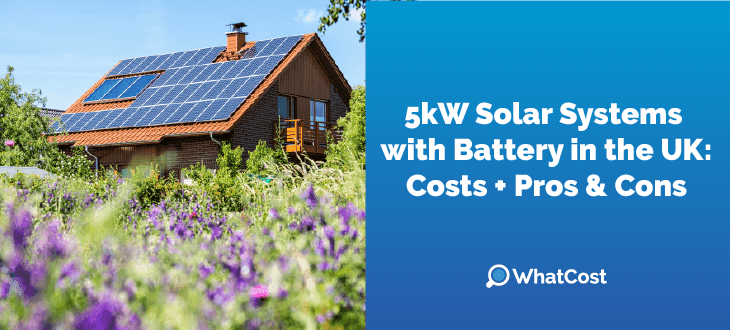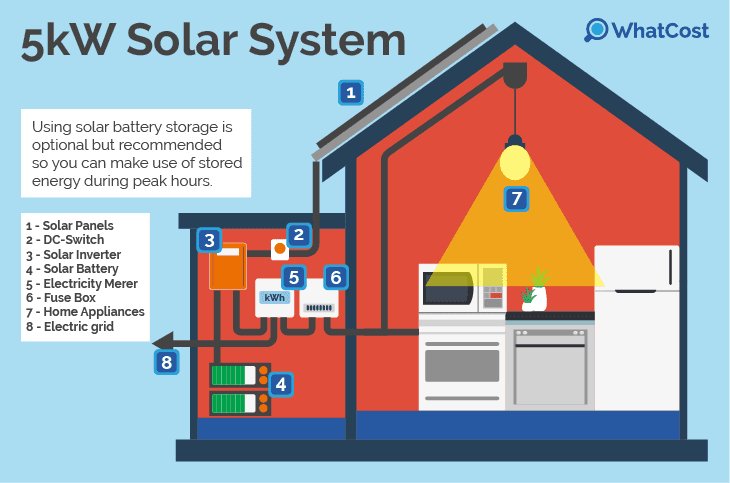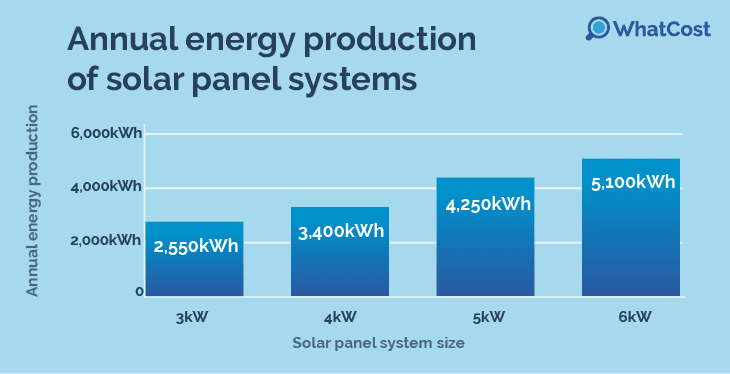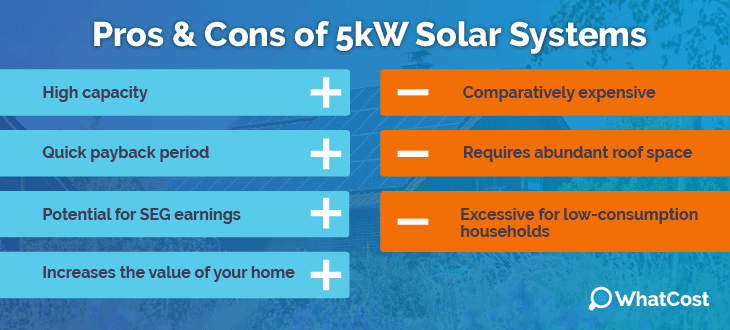Answer these simple questions and we will find you the BEST prices
Which type of solar quotes do you need?
It only takes 30 seconds
100% free with no obligation

Get up to 4 quotes by filling in only 1 quick form

Compare quotes and find yourself the best deal

Increase the value of your home by installing solar panels
- whatcost.co.uk
- Solar Panels
- Solar Panel Systems
- 5kW Solar System
5kW Solar Systems with Battery in the UK: Costs + Pros & Cons


- A 5kW solar system is commonly used in 4-bedroom houses in the UK.
- The average 5kW solar system can cost between £7,500 - £8,500 and breaks even in around 11 years.
- With a solar battery, 5kW systems can cost around £16,500 - £18,500.
- 5kW solar systems produce around 12 - 20kWh a day, enough to power most homes.
5kW solar systems provide energy for most homes in the UK, producing around 12 - 20kWh per day. However, they can cost upwards of £8,500 and can take up 32m2, so they might not be viable for everyone, especially since making the most of them requires a solar battery. Let’s look at their costs, how you can get them at lower prices, and what their advantages and disadvantages are.
However, whatever size of solar panels you require, you’ll still need to find an installer you can trust. This can take days of research and price comparisons if done on your own. Thankfully, we can offer a far better way that takes minimal time and provides you with multiple prices for comparison.
Fill out our 30-second form and we’ll get back to you with up to 4 free, non-binding solar panel quotes from reliable installers. We’ve vetted all the installers in our network so you can be sure you’re getting the best prices available. Click the button below to get started.
- Quotes from local installers
- Payment by finance available
- Save up to £915 per year
It only takes 30 seconds

How does a 5kW solar system with a battery work in the UK?

A solar panel system converts light using photovoltaic cells into electricity. Each solar cell is made of semiconductors and can absorb light. Numerous solar cells packaged together make up one solar panel which can come in a variety of capacities. Similarly, multiple panels packed together can form an array.
Solar panel systems require cabling, brackets, an inverter, and many other components. The panel is attached in the form of a circuit with both negative and positive terminals allowing for the flow of current. The level of current determines the capacity the solar panel can achieve. This current is either sent to the inverter to be converted from DC to AC and then transferred to either the home appliances or a battery.
| 5kW solar panel system specifications | |
|---|---|
| Capacity (on paper) | 5kW |
| Number of panels (350W) | 13 |
| Energy production | 12kWh to 20kWh per day |
| Price | £7,500 - £8,500 |
| Price plus battery | £16,500 - £18,500 |
| Dimensions | 26m2(2m2 per panel at 350W) |
How many panels there are in a 5kW system can vary based on the size of each panel but it’s generally 12 to 17. It would take 13 panels with 350W capacity and 10 at 450W capacity. These panels together will provide roughly 12kWh to 20kWh, although in the UK this will tend to lean more towards 12kWh due to the lack of sunlight hours.
With a battery, these systems can make full use of their power and collect power for use during less expensive hours (if off-peak timings apply in your area). Batteries can be lead-acid or lithium-ion batteries, with the latter being about twice as powerful but also more expensive.
A typical solar battery price for a 2 to 3-person home will range between £8,000 to £10,000. Far cheaper options are also available if you have lower energy needs or only want to charge a few appliances as opposed to a wide range.
5kW solar system prices and costs in the UK
A 5kW solar system with a battery will cost between £16,500 - £18,500. The main price will depend on what size battery you need.
| 5kW solar panel cost | |
|---|---|
| Product | Price |
| 5kW solar panel system | £7,500 - £8,500 |
| Battery system | £9,000 – £10,000 |
| 5kW system plus battery | £16,500 - £18,500 |
| Labour costs (per day) | £600 - £1,000 |
| Maintenance cost per panel | £4 - £15 |
Another factor to consider is how many panels in a 5kW solar system there are since 12 to 17 panels can take up a lot of roof space. Many may not have sufficient space in their home, as this can be about 32m2 in total, with every solar panel for 5kW systems being roughly 2m2.
The cost of 5kW solar system installation can vary depending on your installer as well, which is why you should check multiple prices.
How much electricity will a 5kW solar system generate?

Solar 5kW systems generate roughly 4,250kWh per year when you factor in the loss of efficiency. That comes down to 354kWh per month. On a daily basis, they can produce 12kWh in the UK on average. This makes them more than equipped to handle the energy needs of most homes.
They can potentially be a great off-grid solution due to their size. This would require a 5kW solar system with batteries of an appropriate size. For the average household, 11kWh to 12kWh batteries would suffice. Consider a 12kW solar system for a larger household with higher energy needs.
If you're energy use is much lower than this however, you might want to look further at a 3kW solar system.
What is the break-even point and lifespan of a 5kW solar system?
A 5kW system achieves savings of about £730, breaking even in about 11 years. This is almost as quickly as a 6kW solar system, making 5kWs quite a bargain for less cost. Moreover, since 5kW systems produce more energy than a household may need, there are significant earnings from the Smart Export Guarantee (SEG).
The SEG allows for earnings on excess energy in the range of 1p to 24p per kWh. This varies based on the energy provider you are working with, so be sure to check the rates of the companies in your region.
Solar panels tend to last 25 years on average. Since 5kW solar systems can easily exceed 11 years in lifespan, they can spend 8 years providing pure profit for the rest of that lifetime even after the solar panel cost is covered.
However, one aspect that enhances the performance and longevity of your solar panels is how well they are installed. For that, you will need an installer you can trust which can take days of stressful research and price comparisons. If you (like most people) want to avoid that, why not give our handy service a shot?
All you need to do is fill out a quick 30-second form and we’ll take it from there. We’ll provide you with up to 4 free, non-binding quotes from thoroughly vetted solar panel installers while you sit back and relax. Click the button below to get started.
- Quotes from local installers
- Payment by finance available
- Save up to £915 per year
It only takes 30 seconds

Advantages and disadvantages of a 5kW solar system with battery

Pros:
- High capacity: With higher energy generation, even days with less sunlight will yield viable results. A larger solar system can compensate for the loss of efficiency better than a smaller one.
- Quick payback period: As they generate more energy, they will also be quicker at accomplishing their return on investment. The break-even point is around 11 years.
- Potential for SEG earnings: With a larger system, any excess energy can be given back to the grid for some extra earnings. Depending on your provider SEG earnings can be between 1p to 24p per kWh.
- Increases the value of your home: A powerful solar panel system can be a great draw in terms of real estate prospects. They raise the value of your home by between 4% to 10% for most homes.
Cons:
- Comparatively expensive: There are cheaper systems than a 5kW setup, particularly if you have a modest energy consumption and are not interested in returning electricity to the grid.
- Requires abundant roof space: Requiring about 26 square metres of space, it may not be viable for many homes. This size also increases possible issues with installation. Make sure you have considered how many panels for a 5kW solar system you’ll need to fit on your roof.
- Excessive for low-consumption households: A 5kW system may be more than some homes require, especially for 1 or 2-person households. This would be wasted money unless you were storing it for later use or putting it back in the grid.
Is a 5kW solar system in the UK worth it?
If you have the roof space and can afford one, a 5kW system is definitely worth it. It can provide more than enough energy for the average home. While there are fewer sunlight hours in the UK (4 and a half on average), solar panels are worth it if you have a south-facing roof with a light westward tilt.
Conversely, even if you don’t have the best solar panel angle and orientation, a 5kW system may be powerful enough to still cater to average electricity needs. Even at 30% less efficiency, it covers the average UK household’s energy consumption, i.e. 8.5kWh per day.
All in all, it can be a great choice if you have above-average energy consumption or plan to leverage a higher power system to earn more from excess energy exports. While 5kW solar system costs can be high, there are solar panel grants that can also help you cover part of the installation price tag.
How to find 5kW solar panel system installers in your area
Whether you need a 5kW system or any other solar panel size, you’ll need professional help. A reliable installer can give you a good price with excellent service. However, fielding professionals and assessing their prices can take days of laborious research if undertaken on your own. Luckily, we have a better way to find you the best prices in your area.
Our handy service can quickly and easily provide you with up to 4 free, non-binding quotes from reputable installers. We’ve thoroughly vetted them ourselves, so you can be sure you’re getting quality service. All you need to do is fill out a 30-second form, so click the button below to get started.
- Quotes from local installers
- Payment by finance available
- Save up to £915 per year
It only takes 30 seconds

FAQ
Yes. A 5kW system produces 12kWh to 20kWh a day while most homes in the UK utilise 8.5kWh to 10kWh per day. This is one of the many reasons a 5kW system is worth it.
A 5kW system produces 12kWh to 20kWh a day. This helps them break-even on electricity costs far quicker than lower power systems.
A 5kW solar system with a battery costs between £16,500 – £18,500. Despite the cost, a 5kW system can still be worth it for many households.
Depending on what size panels one installs, a 5kW system will have between 10 (450W) to 13 (350W) panels . Both will ultimately be the same size and generate roughly the same amount of energy.

Rawal is an ex-tech journalist with a passion for sustainable innovations, green policies, and their adoption. With a straightforward writing style meant to be easily digested but full of handy tips, they are geared towards readers of all levels of familiarity with the technologies and home appliances covered.
